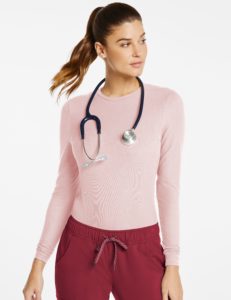
How Much Is Nursing School? A Complete Breakdown
Love the idea of becoming a nurse, but hate the idea of paying for nursing school tuition? You’re not alone.
Across the country, you’d be hard-pressed to find a person who doesn’t hate tuition fees. When it comes to healthcare specifically, we’ve all been there, are currently there or are contemplating being there—even though it’s going to put a crater-sized dent in our bank account.
If you do want to become a nurse practitioner, it’s likely not a decision you’re making lightly. You know it involves taking a long walk into significant debt. But for many of us, nursing is more than a job. It’s a calling that comes out of a heartfelt desire to help others. So while you may hate those fees for nursing courses, the pull to this particular career is most likely more pressing.
If nursing school is something you’re interested in, read on to learn how much a nursing education costs, the hidden fees you need to be aware of and ways you can save money, too.
How much does nursing school usually cost?

How much is nursing school? In short, a lot. But then again, what post-secondary school isn’t?
In terms of nursing school, the tuition costs come down to several key factors:
- The school itself, private versus public.
- The location, in-state versus not.
- The degree you’re aiming for (associates, bachelor’s, master’s or doctors).
- How many months or years the program you’re hoping to enroll in lasts. This is important to know, as nursing school years can range wildly.
Overall, the total cost of your schooling will fluctuate depending on these moving parts. That’s why it’s important to stress, you’ll find no “set” standard nursing cost. However, we can give you a ballpark figure.
If you’re hoping to become a registered nurse with a Bachelor of Science in nursing (or a BSN program), your tuition will range anywhere from $20,000 to $80,000—depending on the school and its location. For a bachelor’s degree, community colleges are easier on the wallet. Once you complete your nursing program, a bachelor’s degree in nursing salary isn’t too shabby, either.
If you want to achieve a graduate degree, such as a master of science in nursing followed by a doctorate, be prepared to pay up to $100,000 for some private schools. Also, keep in mind that certain high-level positions within the nursing field will require more credentials, which means additional schooling and program costs.
On the bright side, some positions only require an associate degree, which is more feasible than earning your bachelor’s. It keeps your nursing school cost per semester down by a significant degree, too.
Different nursing degrees and their cost

If you’re a nursing student, you may be looking at those numbers and panicking a bit. If so, it’s completely understandable. However, we want to stress there’s no reason to fret just yet. Want to work with patients directly instead of being an administrator? Both roles are essential but have very different paths and price tags attached.
Think of it this way: studying smart doesn’t necessarily mean studying for a long time. Remember, quality over quantity. Applying this holistic philosophy will help you efficiently plan your courses in the most cost-effective manner possible.
Certified degree in nursing
Certified degrees are a more financially friendly way to fund your nursing career in comparison to completing a bachelor’s degree. A high school diploma is the core requirement. Most courses last one to three months and require passing a vocational exam for certification.
Certified degree program costs can vary from state to state but are less costly than other nursing school programs because of their shorter length.
Associate degree in nursing
Associate degrees are the next step up in the educational ladder. You’re looking at 12-24 months of schooling to receive your diploma from an accredited school with this career path, followed by a licensing exam. After that, you’ll enter the workforce as a licensed practical nurse (LPN) or a licensed vocational nurse (LVN).
To pay for nursing school in this scenario, the average cost of associate degrees is $10,000-$40,000.
Bachelor of Science in Nursing (BSN)
Bachelor’s programs involve four years of classes, followed by an NCLEX-RN exam. Licensed practical nurses take this path to upgrade their credentials to registered nurses (RN).
Once again, costs vary from school to school, but the average tuition is $40,000-$100,000.
Doctor of nursing practice
If you want to grab a spot as a top-level administrator, you’ll need your doctor’s of nursing degree (DPN). Doctorate programs run $30,000-$70,000, but you can find financial aid incentives for doctorate programs, especially if you’re also doing independent research.
Some extra costs of nursing school

Yes, there are hidden costs to nursing school, much like those surprise baggage fees on an airplane. We’re no fan of these costs either, but you’ll need to factor them into your final bill.
Transportation
How far away are you planning to live from your school? Do you plan to live on campus? If you’re not planning to live on campus, consider your transportation costs.
Vehicles are the most significant expense, along with vehicle maintenance and gas or public transportation. If you choose to live on-campus or within walking distance of school, you can reallocate your transportation fees to your housing budget instead.
Scrubs
Scrubs are part and parcel of the nursing experience. Above all, you need them to be fit, functional and easy to wash. Sometimes, scrubs need to be a specific color, too.
Note, you’ll also be wearing those scrubs a lot. So if you want to maintain your sense of style, consider buying yourself a nice pair. The cost of high-end scrubs can add up, but we’ve got a few options to help.
At Jaanuu, we offer group orders, sales on scrubs and scrub student discounts. Our scrubs are also engineered with durability to last you a long time, eliminating the need to frequently replenish.
Supplies
Scrubs aren’t the only supplies you’ll need as a nursing student. You’ll also need lab coats, stethoscopes, textbooks and lab fees, along with mandatory immunizations, drug screening tests, liability insurance and background checks.
NCLEX-RN exam
If you’re pursuing a career as a registered nurse, you’ll need to pay for the NCLEX-RN exam, along with any additional courses that will increase your chances of passing.
How to make nursing school not so expensive

At this point, you may be thinking, “How can I afford all of this before I’m even making the money that I’ll earn from that degree?”
Money doesn’t grow on trees, after all, and even if you want to become a nurse, sometimes it’s financially untenable. That said, while there’s always going to be some costs incurred as part of your schooling, there are a few ways you can keep these costs down.
In-state schooling
Choose a school close to home instead of out-of-state, where you will incur an additional tuition cost.
Scholarships
Schools and other government programs base your eligibility for scholarships upon grades, overall academic performance, economic circumstances or a combination of all three. Apply for as many scholarships and grants as you can.
Work-study jobs
These allow you to work and earn a living while gaining experience as a nurse. Access to these work opportunities is usually available through a financial aid package.
Student loans
Student loans can help with your fees in the short run. You can apply for private or federal loans, although we should stress that private student loans should be your last option, as they do not offer loan forgiveness.
Working the night shift
If you’ve already received some accreditation and you’re simply going back for additional schooling, working the night shift may be an excellent way to earn some extra money. Best of all, it shouldn’t conflict with your in-person classes.
If you’re interested in learning more about this last option, check out our article on how to survive the night shift.
Nursing can be costly, yes, but the rewards are phenomenal. Explore all your options before committing to a path. Wishing you the very best in your journey ahead!